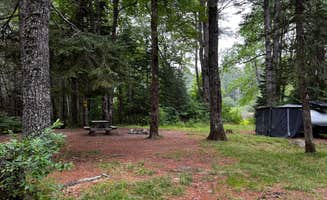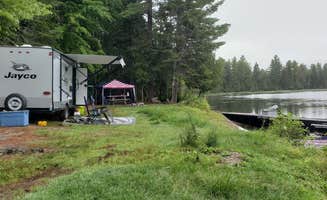Dispersed camping near Milford, Maine offers primitive backcountry sites with several seasonal considerations to account for. The area experiences harsh winters with temperatures frequently dropping below freezing from November through March, making summer and fall the primary camping seasons. Most of these public lands sit between 200-400 feet elevation, creating varied terrain that can challenge navigation but rewards campers with diverse ecosystems ranging from dense forest to riverfront landscapes.
What to do
Fishing opportunities: Machias River Camp off Route 9 provides direct access to the Machias River for anglers. As Tim M. notes, this area features "established campsites right on Machias river," making it convenient for morning fishing sessions.
Trail exploration: Several established paths connect camping areas to waterways and deeper forest regions. Some campers report finding unmarked trails that lead to additional remote sites. "There is a marked trail in the camp that leads deep into the woods," according to one visitor who "followed it for about a mile before it got too thick."
Swimming spots: During summer months, the river access points provide cooling relief. Water levels vary seasonally, with spring typically offering higher water levels due to snowmelt, while late summer provides calmer, more swimmable conditions at most riverside sites.
What campers like
Riverside privacy: Machias Rips Campsite earns praise for its layout. "The sites are spaced out nicely and there's a fair amount of shade to be had," one camper reports, highlighting the natural separation between camping areas.
No reservation requirement: The first-come, first-served nature of these sites appeals to spontaneous travelers. Gary mentions it's "great free off grid camping near Canadian border," emphasizing the accessibility for cross-border travelers without needing advance planning.
Clean facilities: Despite the primitive nature, some dispersed areas maintain basic amenities. Jillian B. found "beautiful place, clean sites" and noted they were "easy to find and right off rt 9," making them accessible for standard vehicles despite their remote setting.
What you should know
Cell service variability: Connectivity changes dramatically across sites. While one camper reported "4 bars of LTE service (AT&T)" at one location, service at Seboeis Public Lands is described as "spotty once you turn off the main road, but you may be able to find a place to send texts."
Bug protection essential: Insects can be overwhelming, particularly in early summer. "Camp sites today are very buggy—bring your repellent and/or netting," advises one visitor, suggesting that mesh shelters and chemical repellents are practically mandatory equipment.
Site competition: Popular sites fill quickly, especially on weekends and during summer months. Jean C. found at one location that "because it's free and extended(14-day) stays are permitted, it can be hard to snag a drive-in, lakefront site" after returning "on 3 consecutive weekdays" to find "the only drive-in sites were occupied by the same campers."
Tips for camping with families
Lean-to options: For families new to primitive camping, Machias Rips Campsite offers sturdy shelter options. Sarah C. stayed "in the lean-to on our way to the Cutler Coast" and found it "was large enough for us to pitch our 3 person tent in and it was pretty great to fall asleep to the sounds of the Machias River."
Toilet considerations: Some sites feature maintained outhouses while others have none. One camper observed that Machias Rips has "a relatively new and quite clean pit toilet available for use," but cautions the site "seems to be a bathroom pit-stop for travelers on rt 9," creating "lots of traffic driving in, using the toilet and then driving right back out."
Weather preparedness: Lakeside sites experience more wind and temperature fluctuations. Jean C. notes that Seboeis lake "can get choppy when it's windy," requiring extra tent stakes and secure storage of loose items when camping with children near the water.
Tips from RVers
Site leveling challenges: RV campers should bring leveling blocks. At several locations, visitors note "there is some slope to the lakefront sites," requiring additional setup time and equipment for larger vehicles to achieve stability.
Road conditions: Access roads deteriorate after rain, challenging larger vehicles. John R. mentions, "The dirt road leading to the camp can be easily missed if not paying attention!" He adds there are "a few pot holes but nothing my stock (low to the ground) Dodge Caravan couldn't handle," suggesting careful driving for RVs.



